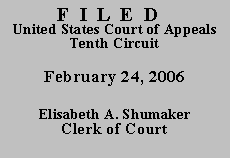

| UNITED STATES OF AMERICA, |
No. 04-2276 (D.C. No. CR-04-430) |
The base offense level under the U.S.S.G. for a person convicted of violating 8 U.S.C. § 1326 is eight. At sentencing, the district court, in accord with the Pre-Sentence Report (PSR), raised the defendant's base offense level by 16 levels pursuant to U.S.S.G. § 2L1.2(b)(1)(A) because defendant was previously deported after a criminal conviction in Colorado for violating Colo. Rev. Stat. 18-3-404.(1) The defendant objected to raising his base offense level by 16 levels, arguing that his conviction in Colorado was not based on a "crime of violence." The district court overruled that objection. Thus, defendant's base level was adjusted from eight to 24. The district court then reduced defendant's adjusted base level from 24 by three levels (to 21) for acceptance of responsibility. With a total offense level of 21, and a criminal history category of III, the guideline range was 46 to 57 months imprisonment. As indicated, the district court sentenced the defendant to imprisonment for 46 months.
On appeal, the defendant argues that the district court erred in adjusting his offense level from eight to 24 for having been previously convicted in Colorado for a "crime of violence." Without the 16 level increase, defendant's guideline range would, of course, have been much less than 46 to 57 months imprisonment.
It would appear that in reaching its conclusion that the defendant had been previously convicted in Colorado for a "crime of violence," the district court relied on information in the PSR, which information, in turn, had been contained in a pre-sentence report prepared by a probation officer in Colorado. Such being the case, the government, on appeal, concedes that the sentence imposed in the present case should be vacated and that the case be remanded so that the district court could determine "whether there is sufficient evidence, consistent with the Supreme Court's opinion in Shepard [Shepard v. United States, 125 S.Ct. 1254 (2005)] to support its determination that defendant was convicted of the 'crime of violence'." We agree.
In this same connection, defendant's counsel argues that we, on the record before us, should hold that as a matter of law defendant's prior conviction in Colorado was not for a "crime of violence." This we decline to do. This entire matter should be more fully developed at re-sentencing before determining whether his prior conviction in Colorado was a "crime of violence." For example, from the present record, it is not exactly clear as to just what crime the defendant was convicted of in the prior proceeding in Colorado. There are statements concerning such in the PSR, but this matter should be more fully explored upon remand.(2)
Also, the defendant argues in this Court that, in any event, the sentence should be vacated and the case remanded for re-sentencing consistent with United States v. Booker, 125 S.Ct. 738 (2005). At sentencing, the defendant did object to any sentence enhancement, citing in support thereof Blakely v. Washington, 542 U.S. 296 (2004), and Apprendi v. New Jersey, 530 U.S. 466 (2000). In any event, the government agrees that the district court at sentencing considered the U.S.S.G. to be "mandatory," and that accordingly, the sentence imposed in the instant case should be vacated and the case remanded for re-sentencing in accord with Booker. The government concedes that it cannot show that the district court's error was only "harmless error," citing United States v. Labastida-Segura, 396 F.3d 1140, 1143 (10th Cir. 2005).
This matter is remanded with instructions to vacate Mr. Ochoa-Fernandez' sentence and, after hearing, to resentence him.
ENTERED FOR THE COURT
Robert H. McWilliams
Senior Circuit Judge
*. This order and judgment is not binding precedent, except under the doctrines of law of the case, res judicata, and collateral estoppel. The court generally disfavors the citation of orders and judgments; nevertheless, an order and judgment may be cited under the terms and conditions of 10th Cir. R. 36.3.
1. Specifically, according to the PSR, the defendant was convicted of unlawful sexual contact on a child in a district court for the City and County of Denver, Colorado, which, inter alia, resulted in his deportation.
2. The relevant Sentencing Guideline Application Note defines "crime of violence" for purposes of § 2L1.2(b)(1)(A) as, inter alia, "forcible sex, statutory rape, sexual abuse of a minor, . . . or any offense . . . that has as an element the use, attempted use, or threatened use of physical forces against the person of another." U.S.S.G. § 2L1.2, cmt. 1(B)(iii). Here, the defendant was convicted under Colo. Rev. Stat. § 18-3-404(1)(a), which provides that "[a]ny actor who knowingly subjects a victim to any sexual contact commits unlawful sexual contact if . . . [t]he actor knows that the victim does not consent." Because a child is legally incapable of consenting, the Colorado statute "reaches behavior that may or may not encompass conduct that constitutes a crime of violence." United States v. Austin, 426 F.3d 1266, 1270 (10th Cir. 2005) (quotations omitted). Thus, on remand, the sentencing court may "look to the charging paper and judgment of conviction in order to determine if the actual offense the defendant was convicted of qualifies as a crime of violence." Id. (quotations omitted); see also Sheperd v. United States, 125 S. Ct. 1254, 1257 (2005) (holding that "a later court determining the character of an admitted offense" under a conviction statute that reaches different types of conduct that may or may not constitute a crime of violence "is generally limited to examining the statutory definition, charging document, written plea agreement, transcript of plea colloquy, and any explicit factual findings by the trial judge to which the defendant assented").